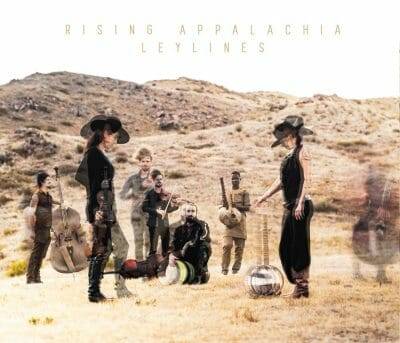Rising Appalachia Ley Lines
Rising Appalachia
Ley Lines
Blends cultures and harmonies into pure bliss
Patrick O’Heffernan
The word “ley lines” was coined in 1921 by the amateur English archaeologist Alfred Watkins, describing the apparent alignments among historical and geological spaces, hypothesizing that they had persisted over millennia to facilitate travel, trade and community. Later, others theorized that global ley lines exist to transmit energy and light from the sun and stars to create magical bliss in spaces for sacred healing rituals. All of which is a good introduction to the music of Rising Appalachia and their just released 7th studio album, Ley Lines. The album brings stellar energy, blissful melody and a healing message for the soul and the earth.
The Atlanta-based sisters Chloe and Leah Smith have traveled the world , touring by sailboat, train, and van, to fill venues and festivals in the US, Canada and Europe, and participate in cultural exchange programs in Bulgaria, Ireland, Italy, and Central and South America. Along the way they have absorbed the rhythms, melodies and the emotions of many cultures. This enables them to seamlessly blend American roots music with Celtic instrumentation and African percussion – with a bit of blues thrown in. Centering their music on their main instrument, their golden harmonizing voices, they take listeners live and recorded across the world on ley lines of musical magic.
Ley Lines distills the Smith sister’s lifetime of musical experience into 12 songs, each one a work of precise craft and joyful art. Opening the album with their voices unifying in “I Believe in Being Ready”, a deeply Southern and seemingly religious apocalyptic ballad driven by the bodhran (Irish hand drum), the sisters immediately let you know this album is something special. It is followed by the swaying “Harmonize”, released in February and premiered by Rolling Stone as the album’s first single. They are then joined by Ani DiFranco on “Speak Out” , asking “what have you done to this kingdom”, excoriating the powers-that-be for pollution of the geographic, political and cultural landscape of their home, the South.
“Love Her in the Morning” and “Shed Your Grace” follow with South Carolina roots, folk, and reggae singer/songwriter Trevor Hall to shift both the tempo and your emotional state as Chloe and Leah weave their harmonies with Celtic undertones and other voices. They move smoothly to the hypnotic, almost blues like minor-tones of “Sadjuna”, mixing African male vocals with their ghostly synchronization and Irish fiddling in this deeply penetrating song about coastal Ghana. The gut-wrench continues with “Magic Maker” as they sing “what are we going to do with the wicked of the word….the smoke and mirrors…those in power”. Moving onto “Sassafras” they swing back to Appalachia, but with the Irish bodran and subdued sounds of Biko Casini on the n’goni (West African resonant harp).
The mood shifts 180 degrees with their original song “Sunny Days” a delightful a’cappella tribute to the roots music of Appalachia and old southern gospel extolling the simple beauty of the land – mountains, streams, spaces to find peace –spaces that have been defiled by mines and roads and loggers but still endure.
My favorite song on the album, Rising Appalachia’s version of Robert Hunter’s “Cuckoo” is musically evocative of the Ireland of my ancestors while sailing us through one of Americana’s staunchest stories in a musical vessel of mesmerizing, otherworldly harmonies. Simply stunning.
We go from the close-your-eyes and drift of “Cuckoo” to “Indigo Dance”, a smoky nightclub of a song with the sisters’ blues/rap colored with the trumpet of Maurice Turner and driven gently with David Brown’s standup bass. Ley Lines ends with the most consequential song on an album of consequential songs, “Resilient”. Released last year to high praise on NPR the song was labeled “protest music for the modern age” by Rolling Stone,. The sisters sing of “my roots down deep” as Arena Diarra ramps up the tempo and the urgency on the talking drum. An anthem of people/woman/music power, “Resilient” carries you up to the power you know you have, the accomplishments you know you can achieve, and the excitement of being alive. A song to play when you feel down, before you go into battle, and when you are victorious.
Ley Lines is Rising Appalachia’s first studio album recorded outside of the South, completed over a 10-day stretch in a studio overlooking the ocean in Marin County, north of the Golden Gate Bridge. The entire band recorded the album live, with Chloe, Leah, David Brown (stand-up bass, baritone guitar) and Biko Casini (percussion, n’goni) and two new members, West African musician Arouna Diarra (n’goni, talking drum) and Irishman Duncan Wickel (fiddle, cello) in the same room. Produced by Joe Henry – the first time they have used an outside producer, it is a remarkable achievement for less than two weeks work. Rising Appalachia also recorded special guests Ani DiFranco, songwriter Trevor, and jazz trumpeter Maurice Turner on specific songs for Ley Lines.
I recently saw Rising Appalachia live and understood immediately why they fill venues small and large worldwide: musicianship that transcends technique into high art, lyrics that mean something, and pure joy onstage. Ley Lines captures all of that and puts the joy directly into your ears.
Patrick O’Heffernan. Host, Music FridayLive!,
Rising Appalachia https://www.risingappalachia.com
Ley Lines, released May 3. https://stores.portmerch.com/risingappalachia/
“Harmonize” single available https://risingappalachia.fanlink.to/Harmonize
Discover more from Making A Scene!
Subscribe to get the latest posts sent to your email.















































